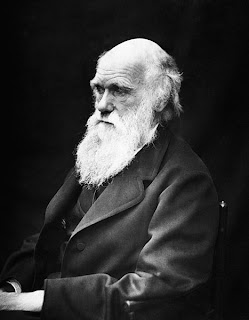 February 12th marks the birthday one of the world’s most famous and controversial scientists, Charles Darwin, whose theory of “natural selection” continues to leave its mark on science, politics and religion today. The year 2009 offers two reasons to celebrate the naturalist: two hundred years since Darwin's birth (12 February 2009) and one hundred and fifty years since the publication of his seminal book, On the Origin of Species (24 November 1859).
February 12th marks the birthday one of the world’s most famous and controversial scientists, Charles Darwin, whose theory of “natural selection” continues to leave its mark on science, politics and religion today. The year 2009 offers two reasons to celebrate the naturalist: two hundred years since Darwin's birth (12 February 2009) and one hundred and fifty years since the publication of his seminal book, On the Origin of Species (24 November 1859). To honor the occasion, the University of Southern Maine and the Census of Marine Life - Gulf of Maine Area Program will host a variety of activities to promote the work of Darwin, including classroom visits; a lecture series, Life in the Gulf of Maine: Past, Present and Future; a webpage for resources and events; and this collaborative blog, Celebrating Darwin.
To honor the occasion, the University of Southern Maine and the Census of Marine Life - Gulf of Maine Area Program will host a variety of activities to promote the work of Darwin, including classroom visits; a lecture series, Life in the Gulf of Maine: Past, Present and Future; a webpage for resources and events; and this collaborative blog, Celebrating Darwin. As part of the year-long celebration, leading scientists from around the region and the world will contribute essays to a weblog reflecting on Darwin’s contribution to their own work, to the scientific community and to the world. Among the contibutors will be:
Reflecting on the past, Dr. Michael Sinclair of the International Scientific Steering Committee for the Census of Marine Life and Darwin enthusiast, will share his insight on a man whose writings and letters show the depth and breadth of Darwin's abilities. Dr. Sinclair regards Darwin as the quintessential scientist and gentleman, whose collaborative spirit is an inspiration to scientists to this day.
Considering the present, Dr. Lewis Incze of the Gulf of Maine Area program of the Census, will discuss how Darwin's contribution to our knowledge of biodiversity is essential to our current understanding of ecosystem processes in the Gulf of Maine.
Looking toward the future, Dr. Boris Worm of Dalhousie U. and lead scientist for the Future of Marine Animal Populations project for the Census, is still inspired by Darwin's ability to draw on detailed observations to form "big picture" theories:
"What Darwin understood like no one before him was that all organisms - including ourselves - are deeply connected, both through their interactions in the "struggle for existence" and over time through the grand forces of evolution. What is most amazing to me, is how he was able to sketch out the Big Story of Life on Earth simply from detailed, open-minded observation. We need to encourage this passion for nature, and skill of observation again in students today."
"What Darwin understood like no one before him was that all organisms - including ourselves - are deeply connected, both through their interactions in the "struggle for existence" and over time through the grand forces of evolution. What is most amazing to me, is how he was able to sketch out the Big Story of Life on Earth simply from detailed, open-minded observation. We need to encourage this passion for nature, and skill of observation again in students today."
Well said, Boris, we hope this blog will do just that.
[Note: The inspitation for this celebration came from Erik Pietrowicz, USM graduate student in Biology, who was recently awarded a small grant from the Society for the Study of Evolution. Congratulations, Erik!]




